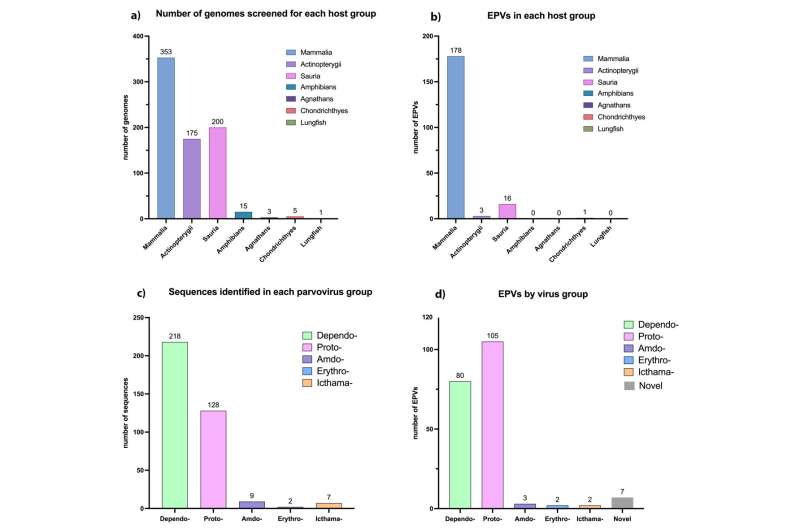Ancient viruses may hold key to effective gene therapy treatments

Scientists have unlocked key insights into virus evolution, revealing new information that could help develop treatments for a wide variety of genetic diseases.
The research, which was led by scientists at the MRC-University of Glasgow Center for Virus Research (CVR) and University of Massachusetts Chan Medical School, focuses on a group of small, ubiquitous viruses called "parvoviruses" (from the Latin word "parvus" meaning small, puny or unimportant).
Many distinct types of parvoviruses infect mammals—including humans—without causing disease. Some have even been successfully harnessed as gene therapy vectors for the treatment of genetic diseases.
In the study, researchers used "fossilized" virus DNA sequences contained within animal genomes to reconstruct the long term evolutionary history of parvoviruses. Their findings show how various distinct types of parvoviruses have evolved in mammals over millions of years, acquiring different specialized properties along the way. This knowledge positions scientists to take instruction from nature in the development of improved gene therapies—for example, the propensity of different parvovirus types to infect different organ systems could be harnessed to target these therapies more effectively.
Dr. Rob Gifford, an evolutionary biologist who led the research at the CVR, said, "This study reveals exciting insights into the long term evolutionary history of an important virus group. Parvovirus gene therapy is a cutting-edge biomedical technology. Our findings suggest that studying the natural biology and evolutionary history of parvoviruses can inform the rational design of vectors for safer and more effective gene therapies."
The researchers have published their data in an open database designed to facilitate the wider utilization of evolution-related knowledge in parvovirus research.
The paper, "Comparative analysis reveals the long-term co-evolutionary history of parvoviruses and vertebrates," is published today in PLOS Biology.
More information: Matthew A. Campbell et al, Comparative analysis reveals the long-term coevolutionary history of parvoviruses and vertebrates, PLOS Biology (2022). DOI: 10.1371/journal.pbio.3001867
Journal information: PLoS Biology
Provided by University of Glasgow


















